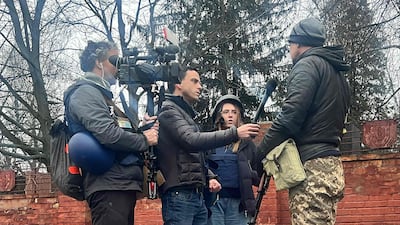As Tucker Carlson of Fox News continued to throw his weight behind Russian President Vladimir Putin and denounce US Sanctions against Russia from the safety of his studio, two of his colleagues in Ukraine died and one was injured.
Pierre Zakrzewski, 55, and Oleksandra Kuvshynova, 24, a local journalist and consultant to the Fox News crew in Ukraine died last week after their vehicle was hit near Kyiv. Only a day earlier, the veteran documentarian Brent Renaud, working on a long format project on refugees, was shot outside Kyiv.
Zakrzewski was a much revered journalist, working for many years with Fox in Iraq and Afghanistan. Renaud trained as a sociologist and was known for his humanist films, including one depicting Arkansas reservists in the Iraq war. The Ukrainian Ministry of Interior says that as of March 15, five journalists have been killed, 35 wounded and that Russian forces were detaining journalists across Ukraine.
There are nearly 5000 journalists working in Ukraine, the largest land war in Europe since the Second World War. It desperately needs to be reported – as wars in Sarajevo, Syria that targeted civilians needed to be reported. But even for the most experienced reporters, a war like Ukraine is immensely dangerous. Watching Russian forces open fire on Sky News reporters – all of them experienced and accompanied by a security guard – and calling out “Journalists! Journalists!” was chilling.
Yet, we need the words and pictures coming out of Ukraine. Journalism is a crucial pillar of documenting this war.

Lviv in Western Ukraine, close to the Polish border, is full of reporters, some inexperienced, who rushed to the war to learn how to become foreign correspondents. Even established writers such as Salon’s Brian Karem – who have not covered wars, and usually stick to safe White House reporting – have rushed to Kiev because, as he says, “we need facts not propaganda”.
“We need to know,” he wrote in Salon. “That’s why I’m going to Ukraine.”
A similar thing happened with the Arab Uprisings a decade ago – young reporters saw an opportunity to learn the trade in Libya and Syria. Some ended up dead some were injured. The rise of the Islamic State added a new level of danger: kidnapping. The Committee to Protect Journalists is keeping a tally of journalists who have been detained, shot, shelled and robbed.
Reporting from within the circumstances of such wars – as anyone who has worked in Chechnya and Syria can attest to – is often fatally difficult because of the amount of firepower used, with little regard to civilian casualties.
For reporters trying to capture these war crimes, especially photographers and cameramen and women who need to get close, the risks are enormous. The father of my son was shot by a sniper during the conflict in Libya. He survived but some of our friends and colleagues did not.
Before I went to Chechnya for the first time, a veteran war reporter, Miguel Gil Moreno de Mora, who later died in Sierra Leone, told me: “The bombs will drive you to the point of madness. Leave before you go insane.” That was when I saw Grozny levelled to a parking lot. In Aleppo, it was practically the same.
This is what our colleagues are working with. In pre-Covid-19 times, I used to go to the Committee to Protect Journalists annual Press Freedom Awards, which take place in November in New York City. While it’s nice to meet old friends, it is also a solemn time – there, I would meet many colleagues from the field – friends who worked with me in many violent wars, from Bosnia to Somalia to Sierra Leone, Syria and beyond. When we gather, we remember the people we lost along the way. The best journalist, I was told many years ago, when I first pulled a flak jacket over my head, is the one who gets out alive to tell the story.
Worse is the state of news inside Russia. The New York Times and the BBC pulled their journalists out of Russia because it was impossible for them to work with the new “fake news” law, which carries 15 years imprisonment. Mr Putin is allowing only his version of the war – not a war, but an operation to free Ukrainian people from Nazis – to flourish.
Last week, Nick Clegg, Meta president of global affairs said last week in response to the ban: "Soon millions of ordinary Russians will find themselves cut off from reliable information, deprived of their everyday ways of connecting with family and friends and silence from speaking out."
Russian news is using the term “military operation” not war or invasion; and articles like “The New World Order” heralding Russian dominance over Nato.
Brian Karem told MSNBC that he left his comfortable perch at the White House to be a field reporter because he felt reporters had to see what was happening on the ground.
Reporters are an integral part of war – to document human rights abuse and civilian suffering. Warring parties should respect their presence in the field. Under International Humanitarian Law, journalists are considered civilians: targeting them is a war crime. News gatherers should be considered untouchable, white flags. Christiane Amanpour, who came of age during the Bosnian war, once called reporting war and human rights violations “shining a light in the darkest corners”. Never has it been truer.


